Are you watching the Olympics? Are your kids asking difficult questions about luges, double axels, curling, or the definition of “pentathalon?”
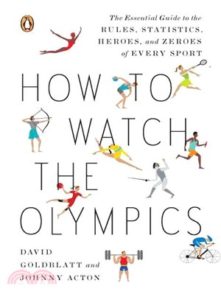
|
David Goldblatt and Johnny Acton’s How to Watch the Olympics: The Essential Guide to the Rules, Statistics, Heroes, and Zeroes of Every Sport (Penguin Books, 2012) has everything from the words to the Olympic Anthem to a list of discontinued Olympic events (no more bike polo or croquet), plus rules, statistics, and interesting histories for each of the 29 summer sports. The book of choice should your kids demand to know the width of a balance beam or the origin of the shuttlecock. |
Table of Contents
HISTORY AND THE OLYMPICS
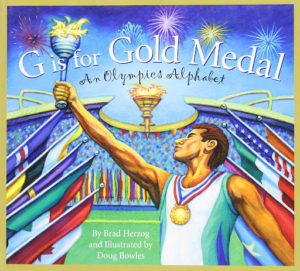
|
Brad Herzog’s G is for Gold Medal (Sleeping Bear Press, 2011) is an Olympics alphabet book in which each (alphabetical) Olympic feature is accompanied by a short rhyme and – for fact-lovers – side paragraphs in smaller print with detailed explanations. A, for example, stands for “Ancient Greece and Athens/that’s our first letter – A/The Olympics began then and there/long ago and far away.” For ages 4-9. |
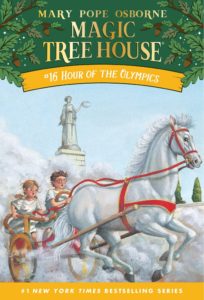 |
For fans of Mary Pope Osborne’s Magic Tree House series, Hour of the Olympics (Random House Books for Young Readers, 1998) sends Jack and Annie back in time to ancient Greece where they visit the first Olympic games. For ages 5 and up. |
| Ancient Greece and the Olympics by Mary Pope Osborne and Natalie Pope Boyce (Random House Books for Young Readers, 2004) is the nonfiction companion to Hour of the Olympics, a reader-friendly, illustrated, 128-page compendium of information on ancient Greek geography, history, religion, daily life, culture, and the Olympics games, then and now. For ages 5 and up. | |
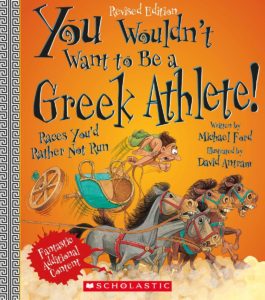
|
Michael Ford’s You Wouldn’t Want to Be a Greek Athlete (Franklin Watts, 2004) follows the life of a young Greek boy through training and participation in the Olympic games. Set in the mid-5th century BCE, the 32-page book is a mix of humor and history, illustrated with cartoons, labeled diagrams, and informational sidebars. One of the You Wouldn’t Want To…series. For ages 8-12. |
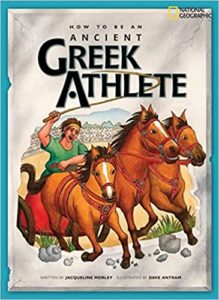
|
For those who think they might want to be a Greek athlete anyway, see Jacqueline Morley’s 32-page How to Be an Ancient Greek Athlete (National Geographic Children’s Books, 2008). Learn all about the ancient athletic training process and take the quiz at the end to see if you’d qualify for the Games. (Girls need not apply.) For ages 8-12. |
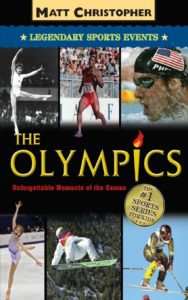 |
Matt Christopher’s The Olympics: Legendary Sports Event (Little, Brown, 2008) is a 112-page history of the Games, beginning with the ancient Greeks. Various chapters cover new traditions in the modern Olympics, the Olympics in time of war, protests and the Olympics, memorable moments, and more. For ages 8-12. |
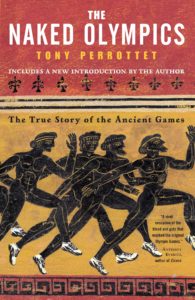 |
Tony Perrottet’s The Naked Olympics: The True Story of the Ancient Games (Random House, 2004) is a thoroughly entertaining non-fiction account of the original Olympics, once a Woodstock-like extravaganza attended by 40,000 spectators from all over the Greek world. For teenagers and adults. |
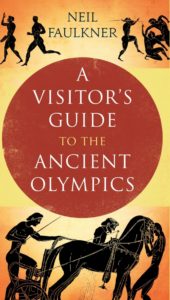 |
Archaeologist Neil Faulkner’s A Visitor’s Guide to the Ancient Olympics (Yale University Press, 2012) – written in the style of a travel guide – is an enthralling and info-packed overview of the ancient games in all their glory and squalor, with color illustrations and a helpful list of “Must-See Monuments.” For teenagers and adults. |
| From history teacher Mr. Donn, Ancient Greek Olympics, targeted at kids, provides background on the Games and explains what it was like to be a contestant from each of five competing city-states: Sparta (“Be proud! You have endured unbelievable pain and hardship to become a superior Spartan soldier and citizen!”), Athens, Corinth, Argos, and Megara. Appended is an excellent list of links for Ancient Greece and the Ancient Greek Olympics, including interactive games and lesson plans. | |
| From Core Knowledge, the multi-part unit Ancient Greece covers the origin of the Olympic Games (along with much else). Targeted at grade 2. | |
| From the BBC, Ancient Greeks: The Olympic Games is an informational history site with nicely presented background information, fun facts, a photo gallery of ancient Olympic-themed art, and interactive online activities. Targeted at elementary-level students. | |
| Cool graphics! From the Smithsonian, see a history of Olympic pictographs. | |
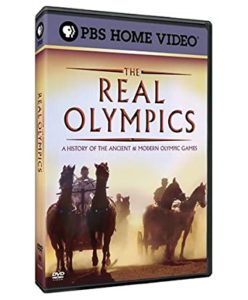 |
From PBS, The Real Olympics is a documentary history of the ancient and modern games. |
